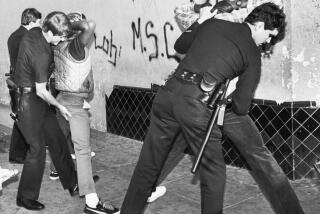Coping with child neglect
It’s a story whose elements are all too familiar. It’s easy to deem it another indictment of our failing child welfare system:
A drug addict who has already lost six children to the foster care system is jailed after her two little boys wander into a liquor store alone, hungry and looking for food. The toddlers — 2 and 3 years old — are wearing soiled diapers and dirty clothes.
It takes police two days to track down their mother whose rap sheet includes arrests for prostitution and theft. Sidnicka Wilson, 32, is nabbed several miles away, with, according to police, a crack pipe and cocaine.
Now the toddlers are in foster care, mom is behind bars and child welfare officials are trying to explain — again — how signs of trouble were missed in a dangerous home.
Wilson was being monitored by county social workers as part of an effort by the Department of Children and Family Services to keep troubled families together by providing support.
It’s not clear yet how much support Wilson received, but it is clear that the supervision was less than she needed.
I’ve seen this often enough to have ready a list of official culprits:
Social workers who’ve been inadequately trained and unconscionably overworked. Supervisors who fail to properly manage their workers and their caseloads. A foster-home shortage that muddies decisions on whether to pull children from troubled parents.
But none of that is likely to change any time soon. So what, in the meantime, are we supposed to do?
::
Kathryn Icenhower meets women like Wilson almost every day. She’s the director of Shields for Families, a South Los Angeles nonprofit that helps low-income families deal with basic problems like shelter and transportation, and long-term issues such as mental illness and substance abuse.
The group has one of the only programs in the nation that keeps children and mothers together while the mothers are being treated for addiction. About 50% of those women are referred by county child protective services.
“Some come into treatment because the alternative is they will lose their children,” Icenhower said. “For some, it’s the way to get their children back.” The average stay is about 18 months; many take more than one stint to become stable and drug free.
Icenhower understands the uproar over this case, but said it’s not helpful to demonize Wilson.
“This is a woman who grew up in foster care, who was traumatized herself, who clearly didn’t have the parenting skills or the resources to begin with. But that doesn’t mean that she doesn’t love her children,” she said.
“Addiction is a disease and once you’ve got it, you don’t have control. You need family support, community support, to take the steps to move forward.”
I don’t know about her family, but Wilson’s community seemed to fall short. I paid a visit Saturday to her neighborhood, in the Green Meadows area of South Los Angeles, near Manchester and Avalon.
The store where the children were found is just around the corner from Wilson’s home. In an area with few grocers, it’s an all-purpose market, purveyor of things as varied as laundry detergent, rolling papers and canned tuna.
Across the street is a charter school — Wisdom Academy for Young Scientists — and a dance studio. I watched proud mothers usher little girls in pink tutus out the door and into their cars.
And I heard grown men in the liquor store parking lot brush off the plight of Wilson’s toddlers. They didn’t seem shocked at the idea of kids in diapers striking out on their own because they hadn’t been fed.
“They came here all the time with their mother,” said a man pushing a bag of laundry in a shopping cart. “They knew where to come to get food. They just didn’t know you have to pay for it.” His buddies laughed.
::
I know it’s not politically correct, but here’s what I would wish for mothers like Wilson:
When your addiction lands your children in the foster care system, you should be ushered into substance abuse treatment and strongly encouraged to use birth control until you’re comfortably clean.
That, said L.A. County’s child welfare director Philip Browning, “is a very sensitive subject.”
If the topic were raised by a social worker, it might feel like coercion, he said. “But if the parent says ‘I would like assistance with family planning,’ we would do whatever we can to make that referral to the right services.”
Women I’ve talked with over the years — those who’ve lost custody of multiple children before they were able to get sober — say they might have welcomed that intervention.
But Shields for Families’ clients are proof the problems can’t be solved with a birth control shot. Icenhower steered me to videos of recovered addicts sharing stories of their failures as mothers.
Some women kept having babies because they missed the ones they were forced to give up. Some, lost in addiction’s blinding fog, were barely aware they were carrying a child. Some got pregnant during a period of sobriety, when they had no intent to go wrong.
They were punished by shame and regret. But the children they bore suffered too; that’s something we can’t afford to forget.
More to Read
Start your day right
Sign up for Essential California for news, features and recommendations from the L.A. Times and beyond in your inbox six days a week.
You may occasionally receive promotional content from the Los Angeles Times.







